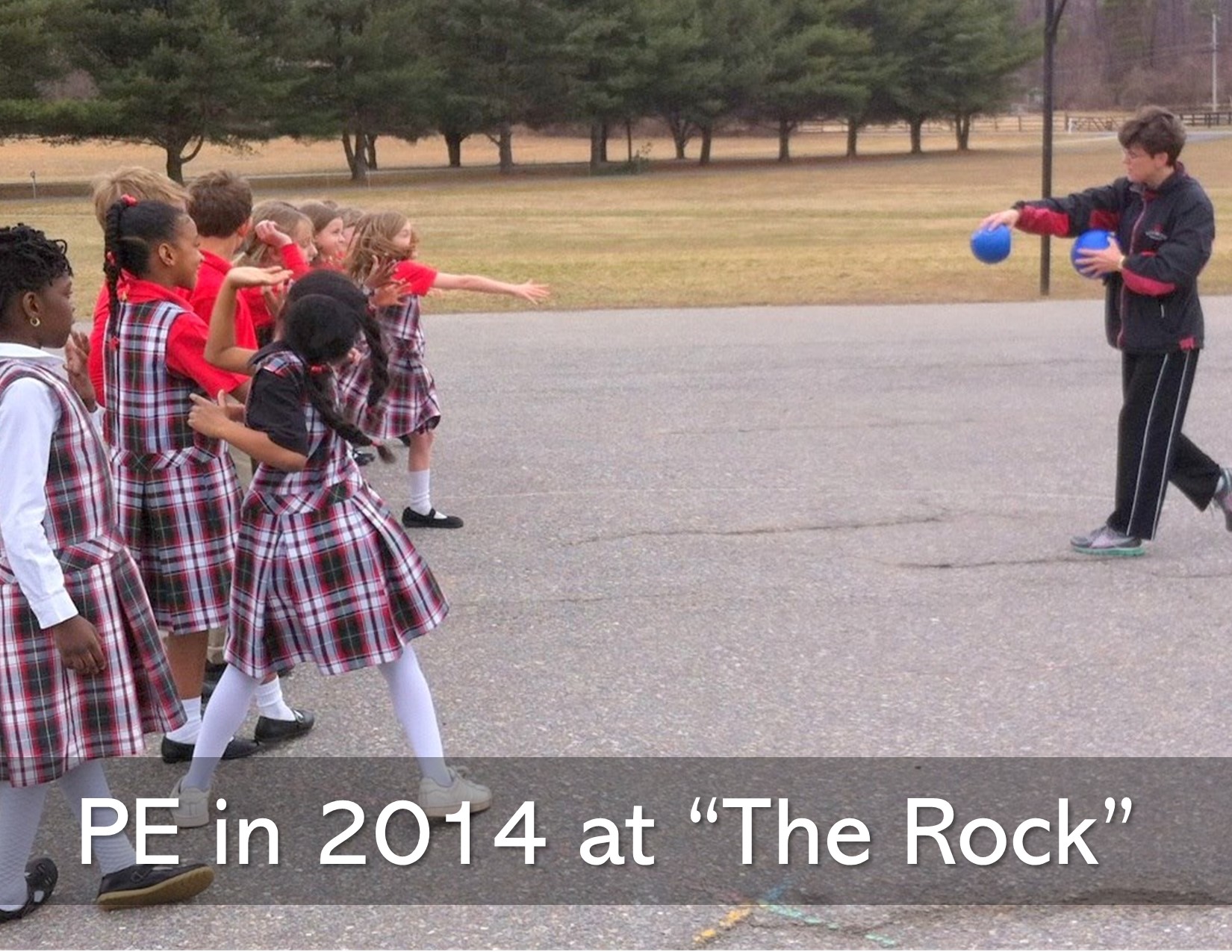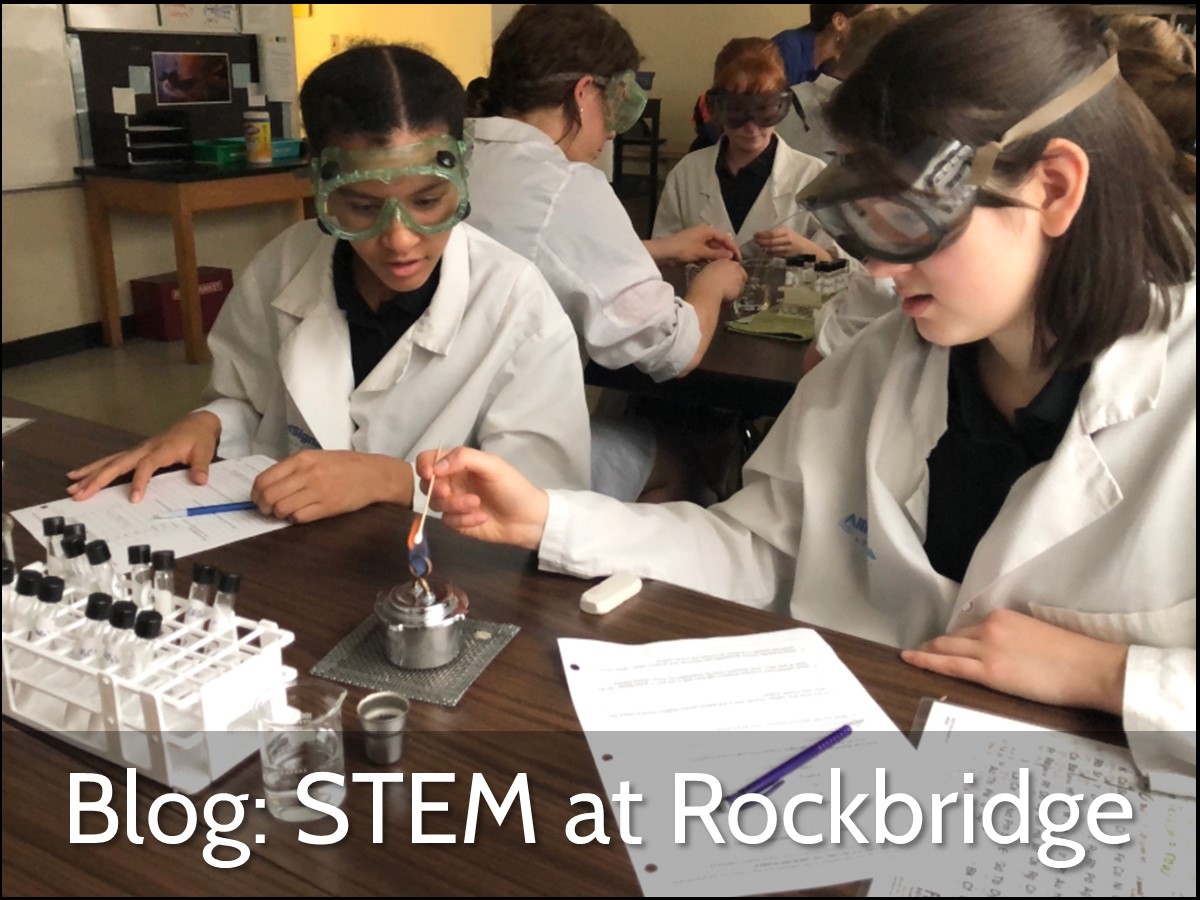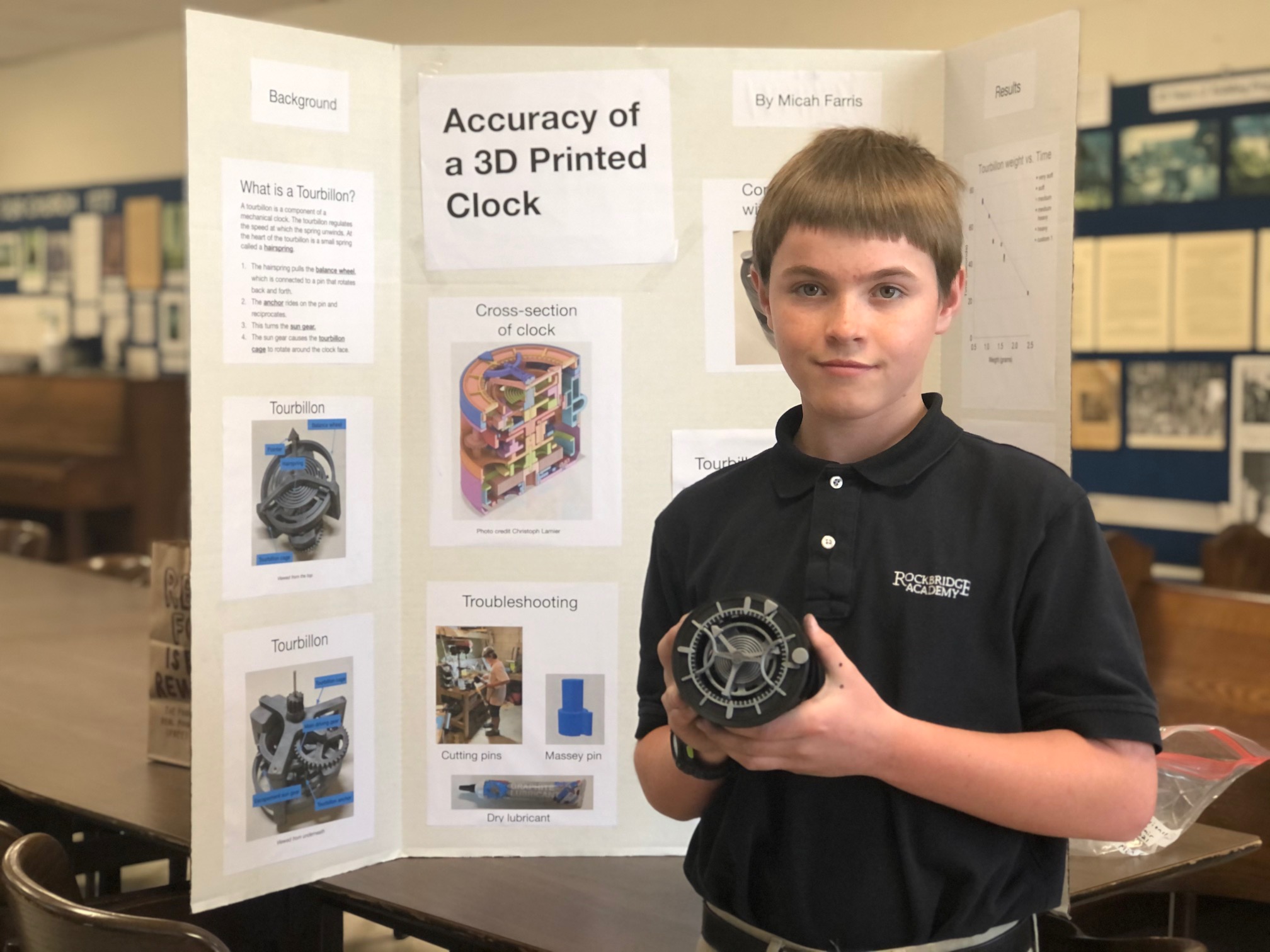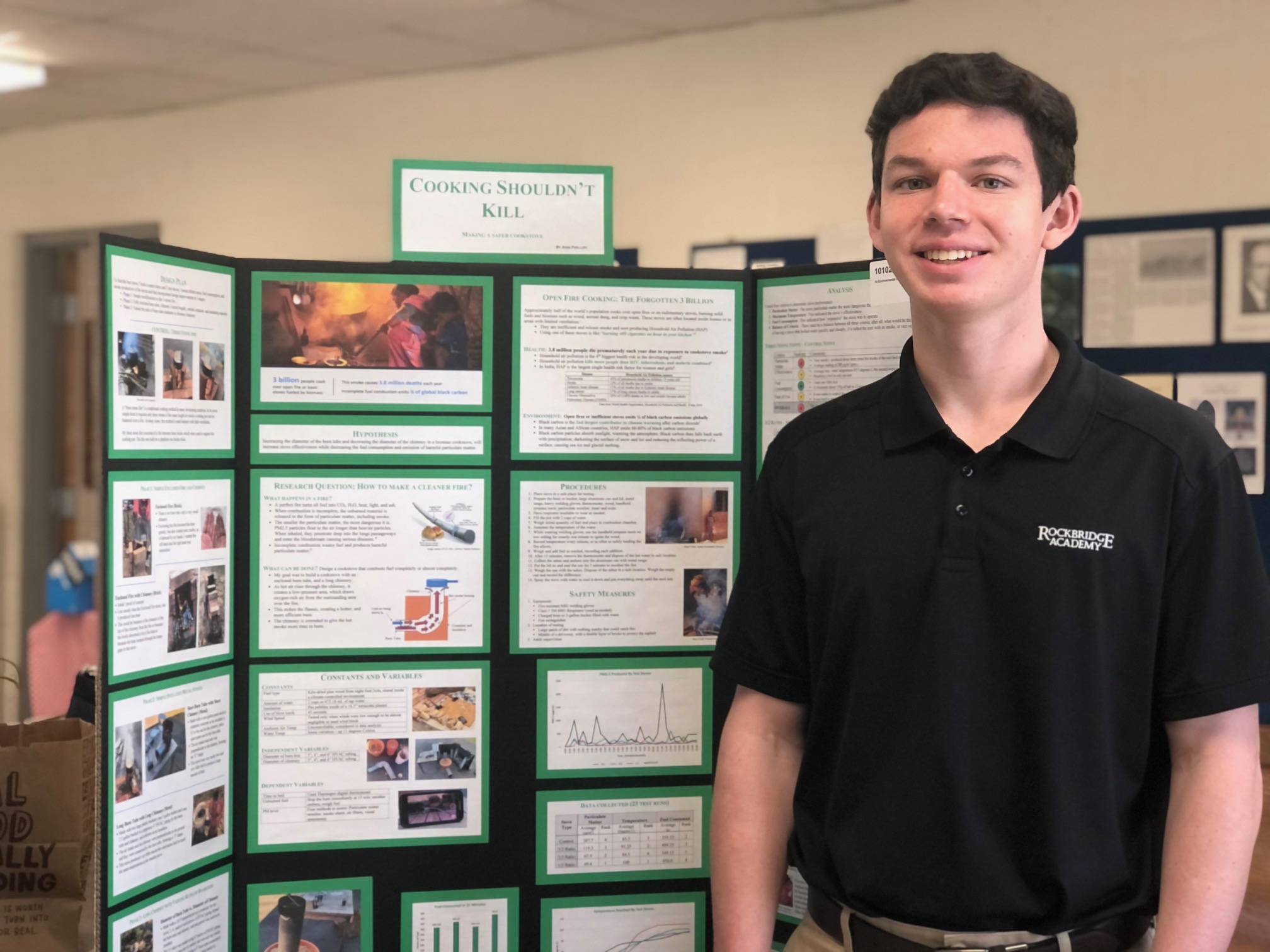Rockbridge Academy Blog
Whimsy, Joy and Witness! The History of Rockbridge Academy PE
 “We would do it differently, or it wouldn’t be worth doing.” That was the attitude that permeated every effort and initiative of Rockbridge Academy’s founding families. This included PE—physical education. The phrase is almost redundant, as if education itself is ever apart from the body. Certainly that was the understanding of our founding families, who determined to provide an integrated education, a classical, christian education which would affirm Colossians 1:17: that all of life was created through Christ and is held together and sustained by Him.
“We would do it differently, or it wouldn’t be worth doing.” That was the attitude that permeated every effort and initiative of Rockbridge Academy’s founding families. This included PE—physical education. The phrase is almost redundant, as if education itself is ever apart from the body. Certainly that was the understanding of our founding families, who determined to provide an integrated education, a classical, christian education which would affirm Colossians 1:17: that all of life was created through Christ and is held together and sustained by Him.
The Scriptures are rife with analogies of the how the body informs the mind and vice versa (Mark 12:30, Prov. 3:7-8, James 3:2, to list a few). In a fallen world that continually tries to dis-integrate what God has integrated, it may seem radical to affirm, as the vision for Rockbridge PE does, that, “God is Sovereign to mysteriously work in the physical world and produce spiritual results. This is most evident in the physical death of the God-man, incarnate to bring about spiritual redemption and new life. Since God has seen fit to integrate the material and the immaterial, the visible and the invisible, we should strive to teach our children that God is glorified in how they use their bodies, as well as their minds and spirits.”
God is glorified when we are good stewards of our physical bodies. In a classical and Christ-centered school, children should be taught how to move skillfully, how to play strategically, and how to exercise consistently and expressively. Our goal in physically educating our children should be that they would be like David, the poet-warrior, who ‘danced before the Lord with all his might’” (II Sam. 6:14).
A little further along in our PE curriculum it reads, “According to the Westminster Catechism, ‘The chief end of man is to glorify God and enjoy Him forever.’ This enjoyment includes physical pleasures such as rolling down a grassy hill, running an invigorating five miles, playing a game of tag, or walking as a family after dinner, all while caring for all aspects of the body. God is glorified when we are good stewards of our physical bodies. In a classical and Christ-centered school, children should be taught how to move skillfully, how to play strategically, and how to exercise consistently and expressively. Our goal in physically educating our children should be that they would be like David, the poet-warrior, who ‘danced before the Lord with all his might’” (II Sam. 6:14).
Did you catch that? These words are written in Rockbridge Academy’s PE curriculum? Reading over these pages again recently, I was reminded of the beautiful vision that was set before me 21 years ago, when Donna Griffith, co-author of this curriculum, PE teacher at the time, and Rockbridge Academy's first Athletic Director, invited me to apply to teach PE at Rockbridge. In that moment, I had no idea how God would use me, only that I was being invited to participate in a distinctive, counter-cultural movement called, “Classical Christian Education,” and one that I had already decided I wanted for my own children.
Donna Griffith mentored me in those days, along with Amy Marshall (who was recognized in the last Benedictio for reaching her 25-year milestone at Rockbridge). Donna’s background and training was in PE, and she had been a college athlete, so when she envisioned PE and athletics from a godly perspective, she knew exactly what they would be distinguished from. PE at Rockbridge would be taught from the Trivium—those three particular stages of development that align so clearly with the growth and development of each child. Her description reads, “Physical Education in the Grammar school helps students become proficient in basic movement skills. In Dialectic, the children refine the skills learned in grammar school and apply them while playing a variety of individual, dual, and team sports. Students also receive instruction in strategies and rules. In Rhetoric, the students continue perfecting their skills in a variety of sports while learning about strategy.” In a recent phone call, Donna recollected that, “This idea was very unique to our school, [the idea that] the playing field is to PE what the chemistry lab is to chemistry.” Children’s knowledge and understanding are used to put on a beautiful display—whether that is exploration and discovery in a lab, in making music or art, in giving a thesis speech, or playing in an athletic competition. Donna went even further in describing this vision as “whimsical,” the desire for our children to have “beautiful coordination” and “majestic and lovely” movement. Whimsy? Yes, of course! When our children fully realize a godly vision in any endeavor, it brings joy—whimsy—the foretaste of Heaven.
Amy Marshall, who taught upper school PE for several years in those early days, may have had this notion in mind when she decided to teach her students ballroom dancing! Most of what she remembers from teaching in those early years was that, “We were aiming at skills acquisition, training men and women according to their frame, being earnest about shaping our 'earthen vessel' to serve God well, and so on.” But it was the ballroom dancing unit that quickly spilled over from her PE students to the rest of the student body. Soon non-PE upper school students were streaming into the gym. Ballroom dancing gave way to swing dancing, and learning that ultimately led to a performance in the Rockbridge Academy Variety Show. And it started with the fun, the delight, of movement in PE class!
If you have read this far, I hope you are encouraged, even inspired by the vision that informs your child’s physical education and athletic participation at Rockbridge Academy. But, I would be remiss if I didn’t elaborate on one additional distinctive. Our PE vision goes on to say that, “Physical education is unique in the opportunities it provides for character development. Physical activities and competition often trigger emotions that aren’t exhibited in the classroom.”
Physical education is unique in the opportunities it provides for character development. Physical activities and competition often trigger emotions that aren’t exhibited in the classroom.
That description sounds a lot like an idea often attributed to Plato suggesting that, "You can discover more about a person in an hour of play than in a year of conversation.” (You can google the quote later for an interesting read on its disputed origin, but I think the essence of the meaning has been accurately preserved.) I can affirm this sentiment from first-hand experience! A game of dodgeball—or basketball, or soccer, or tag or "Sharks and Minnows”—brings out emotions seldom seen during a spelling test or classroom discussion.
So that, “The physical educator has the privilege of teaching the children what God has to say about their emotions and how they should respond to those emotions. The goal of the classical and Christ¬ centered physical education program is to have students exhibit self-control and humility as they play to the best of their God-given ability.”
The goal of the classical and Christ-centered physical education program is to have students exhibit self-control and humility as they play to the best of their God-given ability.
This kind of training, this shaping of character, becomes evangelistic. Our athletic handbook states, “While winning is valued, at Rockbridge Academy, the overriding emphasis is on building the Christian character of our student athletes…Sportsmanship, teamwork, fair play, and the value of hard work are valuable life lessons that can be learned through competitive athletic participation. [Athletic] games afford an opportunity for Rockbridge athletes to act as ambassadors for Christ..[to] show respect and appreciation for our opponents, officials, and coaches.” Of course, for, “We are therefore Christ’s ambassadors, as though God were making His appeal through us.” 2 Cor. 5:20. This is always our first and most important objective as Christians in any endeavor we pursue.
Sportsmanship, teamwork, fair play, and the value of hard work are valuable life lessons that can be learned through competitive athletic participation. [Athletic] games afford an opportunity for Rockbridge athletes to act as ambassadors for Christ...[to] show respect and appreciation for our opponents, officials, and coaches.
Where this vision takes hold of each student, and is brought to fruition by the Holy Spirit, our graduates, whether in a professional stadium, in a collegiate competition, on the neighborhood pickle ball court, or any other area of play, will look very different indeed. Ok, let’s play!
Melanie Kaiss has taught PE at Rockbridge Academy since 2004. She began teaching when her oldest child was in second grade. All four of her children have since graduated from Rockbridge (Classes of 2015, 2016, 2018, and 2024). Over the last 21 years, Melanie has taught PE at every grade level, been assistant to the Athletic Director, coached girls soccer and lacrosse, and run numerous Discovery Summer camps for five years running. Melanie’s husband, Stephen, joined the Rockbridge board shortly after she began teaching. He became a permanent board member and continues to serve today.
House Intramurals: More Than a Game

The Athens Eagles are winning 14-13 against the Siena Rams in an intense volleyball game. Senior Timi Akinyelu executes a flawless jump serve that is received by Miss Knoll in the back row, the ball floats to 9th grader Ella Spraul who sets up junior Linus Salada and he spikes it down right past 7th grader Parker Chason as she dives for the ball. But what is this? Linus Salada calls a net violation on himself; the point goes to Athens! The Eagles continue their volleyball dominance and the entire house erupts in cheers. The school bell rings and all of the students quickly clear out of the gym as they head to 5th period. This fictional scene describes the atmosphere that can be found at Rockbridge’s campus on most Fridays during Conference Time when intramural sports take place. Capture the flag, volleyball, and ultimate frisbee are the fall, winter, and spring intramural sports respectively.
In 2021, Rockbridge Academy introduced a new House System. Every upper school student, 7th-12th grade, and the upper school teachers were assigned one of five houses. The houses are named after cities visited by Rockbridge seniors on Grand Tour. Each house has a symbol and colors taken from 5 of the 17 historic contrade, or districts, of Siena. There is the house of Athens (blue and yellow with an eagle symbol), the house of Rome (black and white with a wolf symbol), the house of Corinth (white and sky blue with a dolphin symbol), the house of Florence (pink and green with a dragon symbol), and the house of Siena (red and yellow with a ram symbol). Once in a house, the student will remain in that house for all of their years at Rockbridge. The houses are evenly divided between the grades and sexes. The House System was primarily designed to encourage and organize service among all of the upper school Rockbridge students. For example, each house is assigned mentoring with the grammar students based on the day of the week.
The Rockbridge house intramurals program was born in November of 2021 when teachers and administrators were discussing how to best use the new 30-minute Conference Time following the upper school lunch period. Now, on almost every Friday starting at noon, four out of the five houses are found competing in various sports. Each sports season consists of 6 weeks of competition. In the sixth week, the two teams with the best records play in a championship competition to determine the Intramurals House Champion. Intramurals give Rockbridge students the opportunity to play sports not already offered in the athletic program.
House Intramurals allow students to engage in physical activity, experience the crucible of self-governed competition, and enjoy the community God has placed them in.
Hours of sitting in a chair, no matter how engaging the subject and the teacher nor how diligent the student, is bound to produce restlessness. God created the human body for movement and when students are able to get away from their desks and participate in physical activity the benefits abound. Exercise reduces stress and increases cognitive function. Exposing students to a variety of sports contributes to the larger goal of developing well-rounded students. While 30 minutes of physical activity in a week is not nearly enough for a healthy upper school student, it fulfills part of the daily recommendation and helps build a positive relationship with physical activity. Volleyball in particular has shown to be a favorite activity among the students which led to a weekly volleyball night over the summer.
House Intramurals are a student-led activity. The students decide who gets to play and who does not, and the students are responsible for following the rules and keeping score. The competition between houses should be spirited, meaning everyone wants their team to win. This combination presents a low-risk but real-life opportunity to practice St. Augustine’s idea of rightly ordered loves. A senior team captain in charge of creating the team lineup may desire to win this game of capture the flag while also desiring to see an enthusiastic yet unathletic 7th grade student get to play. Another student may desire to score the go-ahead point in ultimate frisbee, but she also wants to tell the truth about stepping out of bounds on the catch. None of these interests are wrong, but having the choice to do the one that is more God-honoring is difficult. When a player gets their loves out of order they experience the consequences and hopefully, a teammate is there to encourage them in the truth and wisdom of the Word. This student-led sports competition also provides room for growth in conflict resolution. Conflicts between students have and will continue to bubble up when competing, which opens the door for following the teaching found in Matthew 18. In the Gospel of Matthew, Jesus lays out a preferential sequence to follow when faced with sin between Christians. First, go to your brother alone and point out their fault, next, bring along a witness or two, and finally, if needed, raise the issue to the Christian leaders. Rockbridge staff members will step in when necessary, but the desire is to see students working through these challenges.
The house system assigns teams within a community which often results in groups of otherwise segregated individuals. Even in a school as small as Rockbridge, an 8th-grade girl might not choose to interact with an 11th-grade boy, but when they score a point together in volleyball they naturally turn and give each other a smiling high five. A student involved in theater that does not normally associate with a basketball player can earn an out together on the kickball field. Even when a teacher rolls up his sleeves and whips a dodgeball across the gym at a student, that teacher begins to create a unique bond with his students. God has brought every Rockbridge student and staff member together in a Christian community. Rockbridge is more than just a school, it is a body of believers living life together. God charges His people to have fellowship with one another, and extracurricular activities are a wonderful way to build relationships and create memories among brothers and sisters in Christ.
In order for house intramurals to have the greatest impact on the culture at Rockbridge Academy, there has to be involvement. Participation from every house member, from 7th-12th grade, boys and girls, students and teachers, athletes and non-athletes is vital! Not every house member will be able to play every week, but they should at least try to play at some point in the school year. Even so, competition on the field is not the sole avenue for student involvement; the cheering section adds to the atmosphere and a lively mascot raises the excitement. Each team needs artistic students to contribute their skills when designing house swag and banners. It comes down to every house member having pride in their house and a desire to see their house rise above the rest, whether in their play, their cheers, or their designs.
Participation in house intramurals is about far more than playing games; it results in character growth, interpersonal skills, camaraderie, and growth in conflict resolution, discretion, and sound judgement.
STEM at Rockbridge Academy

Eighth-grader Theodore Grev had a problem. Every time he camped, his sleeping hammock gave him trouble. Setting up at night in the woods, he couldn’t see to secure the knots for his tarp covering. Sometimes the tarp would blow away in the middle of the night, leaving him cold and wet.
Something had to be done.
When he saw the invitation for the Rockbridge STEM Club (Science, Technology, Engineering, and Math), Theodore decided to turn his problem into a science project. Quarantining at home during the summer COVID shutdown, he built one configuration after another, carefully recording the amount of time it took to set up each model. He finally settled on the best one: it took 8 minutes and 30 seconds to assemble and stayed up all night without fail. This winter, he entered it the Regional Science and Engineering Expo. He and his friends have also started using it on their camping trips, with great success.
Theodore is just one of several participants in the STEM Club at Rockbridge Academy.
Other projects this year have included creating an accurate clock with a 3D printer; designing a walking robot; building a low-pollution cooking stove to save lives in the third world; and testing the safety of personal passwords. The club’s record is strong. Last year, freshman Josh Phillips took home 6 awards for his “Cooking Shouldn’t Kill” cookstove design. The year before that, junior Ryan McDowell took his computer security project to the Intel International Science and Engineering Fair (ISEF) and won a “Cyber Pioneer” honorable mention from the National Security Agency.
 How does this work at a classical, Christian school of only 165 middle and high school students? As STEM fields are promoted more heavily in the culture, classical, Christian schools—usually much smaller than their public counterparts—are often questioned about their ability to measure up.
How does this work at a classical, Christian school of only 165 middle and high school students? As STEM fields are promoted more heavily in the culture, classical, Christian schools—usually much smaller than their public counterparts—are often questioned about their ability to measure up.
At Rockbridge Academy, the curriculum includes a strong STEM track of earth science, biology, chemistry, and physics; algebra, geometry, trigonometry, and calculus; and analytical science and logic, which train students to test arguments and formulate proofs. For several years, Rockbridge students have also participated in the American Math Competition and regional and state-wide Science Olympiads, placing well in both.
The study of science and math is historically classical and Christian—grounded firmly in the liberal arts and driven by a desire to comprehend Creation. Classical educators like to quote Apple founder Steve Jobs: “Technology alone is not enough…it’s technology married with liberal arts, married with the humanities, that yields us the result that makes our hearts sing.”
“Technology alone is not enough…it’s technology married with liberal arts, married with the humanities, that yields us the result that makes our hearts sing.” Steve jobs
At Rockbridge, watching students at work DOES make the heart sing.
Cathy Phillips, a graduate of the US Naval Academy with a degree in aero engineering, started the Rockbridge STEM Club when her son Josh was entering high school. Josh had always had a scientific bent, and she wanted to provide an opportunity for students like him to pursue that bent beyond the classroom.
Mrs. Phillips sees excellence in math and the sciences as flowing naturally from a classical education, which girds students with a strong foundation in facts, then invites them to ask the “why” behind those facts—and equips them to present their findings with skill and winsomeness. She notes that classically educated students typically have a strong desire to learn and a strong background in critical thinking. This translates into excellent questions and the persevering spirit to bring their projects to completion.
This year’s participants are competing in a variety of events: the Maryland Engineering Challenge, the County Regional Science and Engineering Expo, and the Junior Science and Humanities Symposium,
Freshman Michael Grube is building a remote-controlled model cargo ship for the Maryland Engineering Challenge. He’s grappling with college-level math and nautical design, but Rockbridge has trained him in fundamental math concepts that are serving him well. Also for the Challenge, sisters Kait and Maddie Atwood are working with Sean Fitch to design and build a walking robot that walks on 2 legs over uneven terrain. And Josh Phillips created a bridge design for the “Wood Bridge Challenge” category of the competition and won first place!
Theodore Grev entered his practical hammock design in the County Regional Science and Engineering Expo. Seventh-grader Micah Farris, who has always had a bent for engineering and enjoys experimenting on his own, decided to create his own clock with a 3D printer. Both of them took 2nd place. The printing took about 100 hours, and there were long days (and nights) of assembling and disassembling the clock, testing different springs, recording the results again and again. Thankfully, he says, his training at Rockbridge had already trained him to be persistent.
 Josh Phillips, who won 6 county awards for his “Cooking Shouldn’t Kill” cookstove design last year, has improved his design and is taking it to the Junior Science and Humanities Symposium (a DOD competition) in 2021. Juniors Emma Williams and Hannah Skwarek decided to examine the effectiveness of common password security questions. After winning the approval of an Institutional Review Board, they conducted multiple interviews, collected online data from their subjects, and determined which questions offer greater security. They are off to compete on the national level.
Josh Phillips, who won 6 county awards for his “Cooking Shouldn’t Kill” cookstove design last year, has improved his design and is taking it to the Junior Science and Humanities Symposium (a DOD competition) in 2021. Juniors Emma Williams and Hannah Skwarek decided to examine the effectiveness of common password security questions. After winning the approval of an Institutional Review Board, they conducted multiple interviews, collected online data from their subjects, and determined which questions offer greater security. They are off to compete on the national level.
Writing and presenting the final project for a panel of experts is a major component of all of these competitions. Yet the students consistently expressed that that was the “easy part.” At Rockbridge, they’ve been honing those skills for years.
While small classical schools may not offer a wide array of specialized math and science classes, they do offer classes that are rigorous, deep, and integrated with one another. In a STEM world that changes with blinding speed and often denies the existence of God, classical Christian education trains adept and willing learners—all while affirming the beauty of creation and greatness of the Creator. These competitions don’t just introduce students to a STEM network of friends and colleagues; they also give them opportunities to shine the light of Christ to a world that needs Him.
